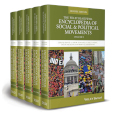Translation and Social Movements
Abstract
Translation is at the center of social movements communicating social change toward broader publics, and diverse, multilingual audiences. Although activists in all times and places have worked at communicating and framing – and thus translating – new visions and ideas into existing social and political contexts, few social movement scholars have thought of these communicative processes through the perspective of translation. In recent years, the “translation turn” in the humanities inspired empirical research on the “politics of translation” within culturally diverse movements. Scholars in comparative literature have thought about how professional interpreters become activists using their multilingual skills for subtitling, interpreting, and translating progressive messages to global, digital audiences, enabling multilingual, inclusive communication in face-to-face encounters such as the World Social Forum created by activists in the global justice movement. Focusing on bilingual, multicultural activists in coalitions on racial justice, migration, or global justice, scholars have discussed the power of these activists as “political translators” enabling democracy and conflict resolution in diverse movements.



